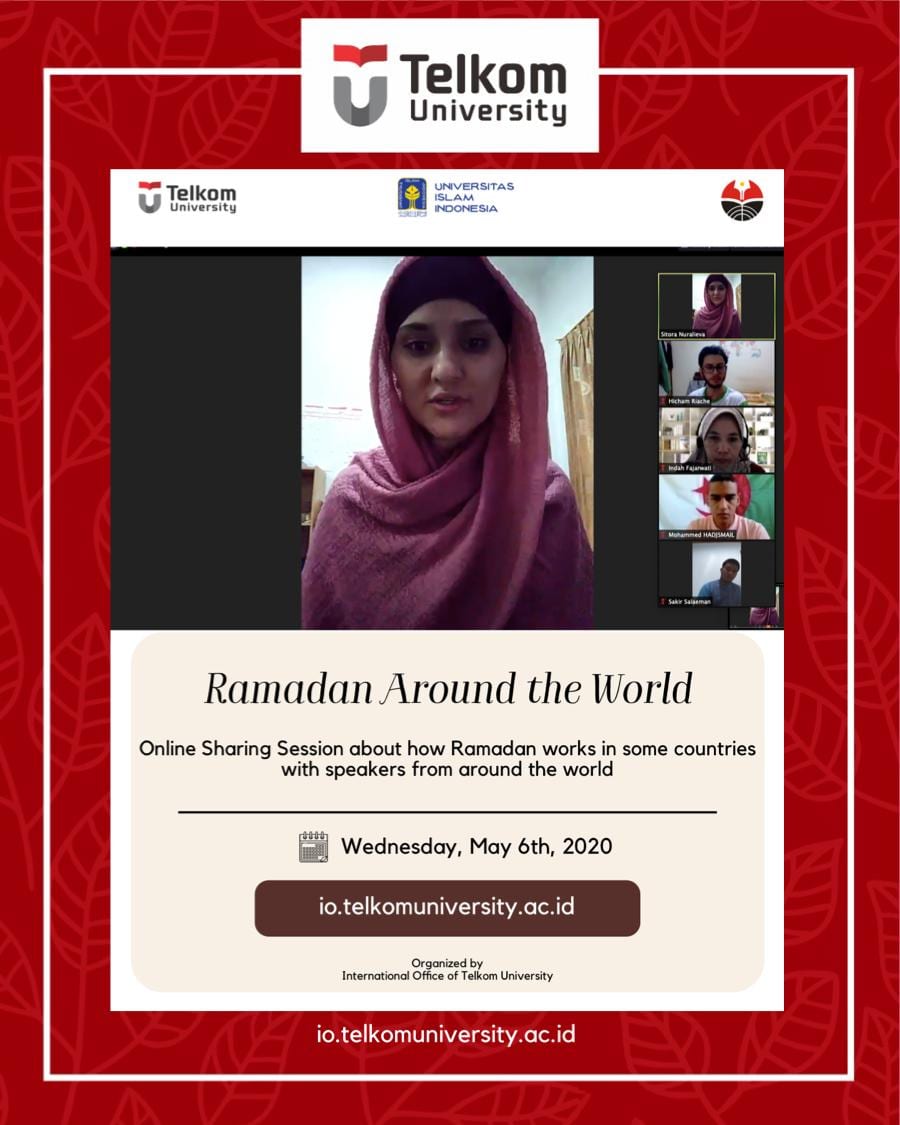
“Ramadan Around the World” Online Sharing Session
“Ramadan Around the World” Online Sharing Session
Marhaban ya ramadan!
On the thirteenth day of Ramadan (6/5/2020), International Office of Telkom University held the 4th Online Sharing Session under the topic “Ramadan Around the World”. For you information, our three online sharing sessions were discussing all about Covid-19 which are currently still the hot issue all around the world, but this time, in order to keep moving and to welcome and spread the positive vibes in the holy month of Ramadan, we invited some speakers from various country to share ramadan tradition in their countries.
In Pakistan, according to Muhammad Sultan Malik, students from pakistan who currently studies at Ilmenau University of Technology, Germany, moslems are fasting around 16 hours while in Germany it’s much longer. Usually, they have moslem community where they gather together to have iftar, tarawih prayer, reciting al-qur’an, or just having a chit chat. But now, since there is Covid-19 as a global pandemic, people just do all ramadan tradition at home with the family. Both in Pakistan and Germany, there is no particular food served in ramadan.
Saprolla Rollie Cale Deporos, student from Philipines who currenty studies at Universitas Pendidikan Indonesia Bandung shared that Islam grows pretty fast in Philipines. In 2010, 5.6% of Filipinos were muslim, however in 2019 the number was increasing into 12%. The duration of fasting in Philipines is around 14 hours. The interesting part of ramadan tradition in Philipines is that government distributed a packed consisting of basic food supply to the society 1-2 days before ramadan and in the middle or end of ramadan. He also shared his experience having ramadan in Indonesia. He said that while in Indonesia there is group of people waking up society in suhoor time by using some equipment like drum, in Philipines, especially in rural area, they ask children to pass the message related to ramadan to the society by knocking door one by one.
Similar to the other, in Tajikistan and Algeria, they are fasting longer than in Indonesia. Sitora student from Tajikistan compared food in Indonesia and Tajikistan is quite different. In Tajikistan, oily and salty food are not necessary in ramadan. Women in Tajikistan do activity and praying at home; they are not allowed to go outside especially for praying in mosque. While in Algeria, Hadismail shared that some people spend their time in mosque during ramadan. Even, some people take leave on their work for 1 month in order to focus on praying in ramadan.
The last speaker was Sakir Salaeman from thailand. He shared that the ramadan tradition in Thailand especially in Pattani is similar to Indonesia as we share similar culture as well. There are tradition of having iftar together, praying tarawih together, and eating kurma and some porage as a takjil.
Basically, all countries share similar tradition like having iftar, tarawih, and Quran recitement. The different now is the place only, all prayers are conducted at home now due to the Covid-19. However, it doesn’t decrease the euphoria to celebrate the blessing of ramadan.(IO)***
